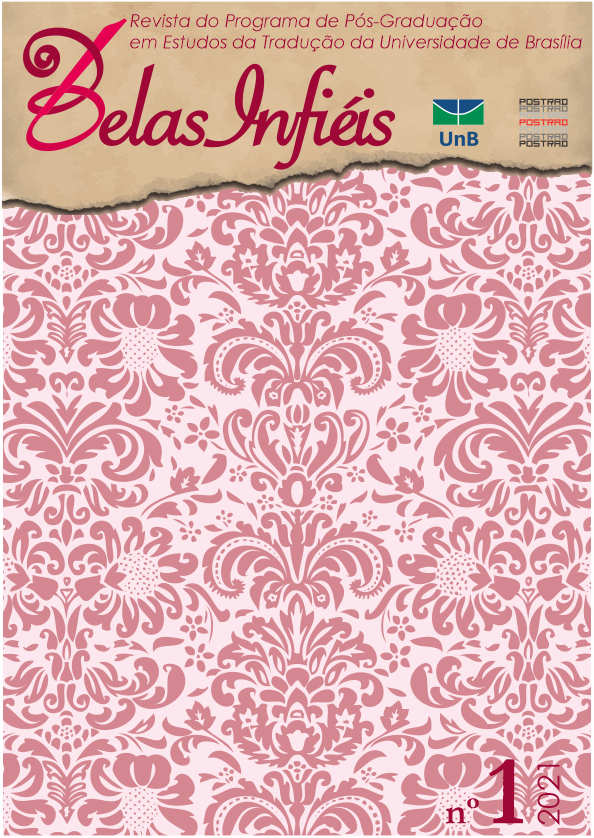A tradução cultural como norte: considerações sobre o apagamento de itens culturais nigerianos na tradução brasileira do romance Fique Comigo, de Ayobami Adebayo
DOI :
https://doi.org/10.26512/belasinfieis.v10.n1.2021.31902Mots-clés :
Stay with me. Ayòbámi Adébáyò. Literatura nigeriana. Tradução cultural. Especificidades culturais.Résumé
Este trabalho se propõe a analisar aspectos culturais da tradução para o português brasileiro do romance Stay with me, de autoria da nigeriana Ayòbámi Adébáyò, publicado originalmente em língua inglesa. Propomos, aqui, mediante cotejamento entre o original e a referida tradução, apontar algumas escolhas tradutórias controversas, passíveis de revisão em edições futuras, bem como aventar algumas hipóteses explicativas que nos ajudem a sopesar as razões por trás das opções de tradução, questionando, a partir de teóricos como Lambert& Van Gorp (2014), Arrojo (2007), Levý (2011) e Aixelá (2013), dentre outros, como o processo de tradução literária pode ser aperfeiçoado no Brasil.
Téléchargements
Références
Adebayo, Ayobami. (2018). Fique comigo. (Marina Vargas, Trans.). Rio de Janeiro: Harper Collins.
Adebayo, Ayobami. (2017). Stay with me. New York: Alfred A. Knopf.
Aixelá, Javier Franco. (2013). Itens Culturais-Específicos em Tradução. (Mayara Matsu Marinho e Roseni Silva, Trans.). In-Traduções, Florianópolis, 5(8), 185-218. ISSN 2176-7904.
Arrojo, Rosemary. (2007). Oficina de tradução: a teoria na prática. 5. ed. São Paulo: Ática. (Série Princípios; 74)
Britto, Paulo Henriques. (2012). A tradução literária. Rio de Janeiro: Civilização Brasileira. (Coleção Filosofia, Literatura & Artes).
Emecheta, Buchi. (2017). As alegrias da maternidade. (Heloisa Jahn, Trans.). Porto Alegre: Dublinense. Título original: The joys of motherhood.
Emecheta, Buchi. (2018). Cidadã de segunda classe. (Heloisa Jahn, Trans.). Porto Alegre: Dublinense. Título original: Second class citizen.
Emecheta, Buchi. (2019). No fundo do poço. (Julia Dantas, Trans.). Porto Alegre: Dublinense. Título original: In the ditch.
Heilbron, Johan & Sapiro, Gisèle. (2009). Por uma sociologia da tradução: balanço e perspectivas. (Marta Pragana Dantas e Adriana Cláudia de Sousa Costa, Trans.). Graphos, João Pessoa, 11(2), 13-28. ISSN 1516-1536,
Lambert, José & Van Gorp, (2014). Hendrik. On describing translations. In Theo Hermans (Ed.). The Manipulation of Literature: Studies in Literary Translation (pp. 42-53). New York: Routledge.
Levý, Jirí. (2011). The art of translation. (Patrick Corness, Trans.). Amsterdam / Philadelphia: John Benjamins Publishing Company.
Milton, John. (1998). Tradução: teoria e prática. 2. ed. São Paulo: Martins Fontes. (Coleção leitura e crítica).
Owomoyela, Oyekan. (2005). Yoruba proverbs. Lincoln: University of Nebraska Press.
Perrone-Moisés, Leyla. (6 abril, 2017) O desprazer do texto. Peixe-Elétrico, blog. Recuperado 13 de agosto de 2019 de https://www.peixe-eletrico.com/single-post/2017/04/06/O-desprazer-do-texto.
Venuti, Lawrence. (1995). The Translator’s Invisibility. Londres / Nova York: Routledge.
Verger, Pierre Fatumbi. (1997). Lendas africanas dos orixás. (Maria Aparecida da Nóbrega, Trans.). 4. ed. Salvador: Corrupio.
Téléchargements
Publié-e
Comment citer
Numéro
Rubrique
Licence
(c) Tous droits réservés CC BY 2021

Cette œuvre est sous licence Creative Commons Attribution 4.0 International.
Copyright Statement
Given the public access to this journal, the texts are free to use but requires the recognition of the original authorship and initial publication in this journal to be properly stated.
The journal allows the use of works published for non-commercial purposes, including the right to submit the work to publicly accessible databases. Published contributions are the sole and exclusive responsibility of the author(s).
- When submitting papers to be evaluated by the Belas Infiéis journal, the author(s):
- Declare that the contents of the contributions are original and of their original creation, being entirely responsible for their content if there is an objection by third parties.
- Claim to be aware that they should not commit academic plagiarism.
- Declare that the manuscript has not been published, completely or partially, in Portuguese or another language. If it is a translation it should be submitted to the Translated Articles section.
- Declare that the manuscript is not being evaluated by other journals.
- Declare that the manuscript was not submitted to another journal simultaneously.
- Commit(s) to inform the journal of any kind of error or inaccuracy in their contribution (published, in evaluation or in editing) and to collaborate with the editors to make due corrections of the article (when in evaluation or editing) or erratum/retraction (after publication).
- Declare that there is no conflict of interest regarding the published work.
- Authorize its release if it is accepted for publication without any kind of monetary compensation.
- Agree to assign non-exclusive rights to publication to the magazine, remaining free to make their contribution available in other media as long as the publication of the first version in Belas Infiéis magazine is mentioned. They also authorize Belas Infiéis to assign their texts for reproduction in content indexers, virtual libraries and similar platforms.
- Maintain copyright and grant the journal the right of first publication, the work being licensed under theCreative Commons Attribution License.
- Is/Are allowed and encouraged to publish and distribute their work online after the editorial process, which may increase the impact and citation of the published work.
- Authorize the editorial team to make textual adjustments and to adapt the article to the publication rules, when necessary.



















